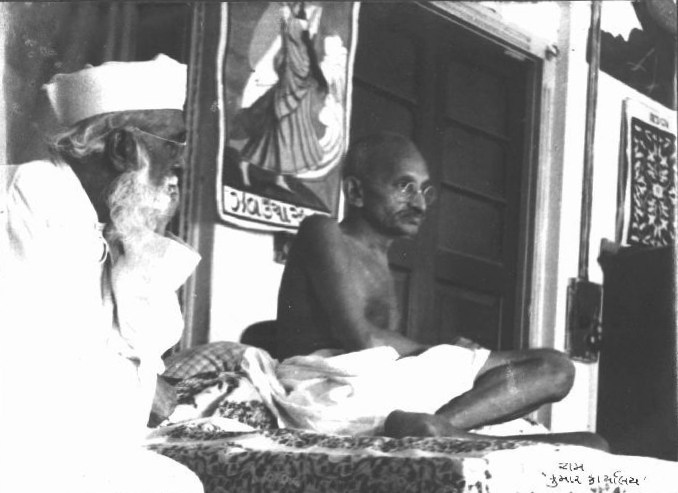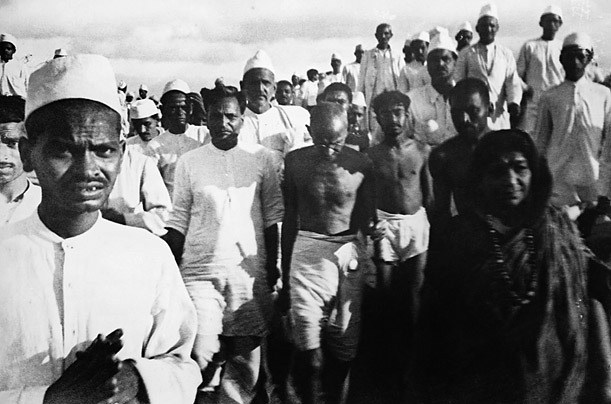The significant role of Muslims in the freedom movement of India is a well-established fact which cannot be obliterated by delation of the names of Muslim freedom fighters from the present-day history books and the indifferent attitude of modern media towards them. A recent instance of this attitude was observed in the very few and scattered references to Muslims in articles, write-ups and reports which have been appearing in newspapers for the last one month in the memory of the Salt Satyagraha, especially the historic Dandi March undertaken by Gandhiji.
It is beyond any doubt that Muslims participated in the Salt Satyagraha with same esthusiasm and zeal which they exhibited in other stages of the freedom struggle. It was with the same sense of involvement in the movement that Muslims fully participated in the famous Dandi March of 25 days (12 March ¨ 5 April, 1930) from Sabarmati Ashram to Dandi village when Muslim villages on the route were neglected. But this did not dampen their spirit. Many of them joined Gandhiji in Dandi itself and also took part In the Satyagraha in other parts of the country.
It is a little-known fact that in Dandi village a Muslim had the privilege of being host to Gandhiji and it was from his house that he launched his Satyagraha. It is also notable that when in the course of setting out for Satyagraha at Dharasana (Gujarat) on 5 May, 1930, Gandhiji was arrested, the Satyagraha was led by Abbas Tayyabji, a prominent Muslim of Mumbai, and he too was arrested. Afterwards, Sarojini Naidu became the leader of the Satyagraha. The distinguished scholar and great freedom fighter Maulana Hifzur Rahman Seoharwi, who was teaching those days in Jamia Islamia, joined Gandhiji’s Satyagraha and was put into prison. It may be also recalled here that according to Maulana Asrarul Haq Qasimi, in those days Gandhiji enquired from Maulana Hifzur Rahman that he had heard that there is a Hadith of the Prophet (pbuh) which says that items of common use like water and salt are to be exempted from tax. Maulana confirmed it and presented the Urdu version of the Hadith to Gandhiji who was very pleased to see it.
The spark ignited by Dandi march spread to different parts of the country. In each city and town people took to streets for demonstration against the repressive Salt Act. They broke the anti-people salt law, defied the government order and were arrested in large number. Muslim participation in all these phases of the Salt Satyagraha is established by the historical records. Muslims too faced the brutalities of the British police along with their Hindu brothers. Apart from a large number of common Muslims, many Ulama were also put into prison during the Salt Satyagraha. They included Mufti Kifayatullah, Maulana Ahmad Sayeed Dehlawi, Maulana Habibur Rahman Ludhianwi, Mufti Muhammad Naim Ludhianwi, Maulana Ataullah Shah Bukhari, Maulana Fakhruddin Moradabadi; Maulana Hifzur Rahman Seoharwi, Mufti Atiqur Rahman Usmani, Maulana Muhammad Shahid Fakhiri, Maulana Sayyid Muhammad Mian Deobandi, Maulana Abdul Qadir Qasuri, Maulana Muhammad Sadiq Karachwi, Maulana Abdul Aziz Gujaranwala and Maulana Bashir Ahmad.
The role of fatwas of the Indian ulama in the freedom movement has been quite effective. It was the famous fatwa of Shah Abdul Aziz against the British government in India (which was later endorsed by hundreds of other ulama) which prompted Muslims to wage jihad against the British and set the freedom movement in motion. Moreover, the fatwas issued by eminent ulama at each crucial stage of the freedom struggle including non-cooperation, civil disobedience and Salt Satyagraha gave great impetus to the movement. Mufti Atiqur Rahman Usmani, the distinguished jurist and freedom fighter, is reported to have issued a fatwa that no government has right to impose taxes on items like water and salt. If any government dares to do this, it becomes necessary for the people to oppose this action and to struggle to get rid of it. These are only some examples that show the participation of different sections of Muslims in the Salt Satyagraha,. Full facts may be brought to light through going into the official records and historical works of that period.
It is a known fact that deliberate attempts are being made by a section of modern historians and writers of the text-books of history to negate the role of Muslims in the freedom movement of India. But inspite of this sinister design, the fact could not be suppressed that India would not have seen the light of the indepence without the joint efforts of Muslims and Hindus and the sacrifices of the different sections of Indian society. The plain truth is that after their arrival and settlement in India centuries ago, Muslims made it their home and considered it their duty to work for the interest of their homeland and to contribute to the overall development of the country.
As a matter of fact, Muslims started the freedom movement and worked whole-heartedly to make it successful with the same sense of duty. In the present scenario, it becomes an obligation on all of us to highlight the role of Muslims in the freedom movement and the progress of the country through different means. It is heartening to know that in the present situation of working of some divisive forces against Muslims, there are many justice and peace-loving non-Muslims like Professor I. K. Shukla who cooperate with Muslims to project the Muslim contribution to the development of India from medieval to modern times.
Dr Zafarul Islam Islahi teaches in the department of Islamic studies, AMU, and may be contacted at zafarul.islam@gmail.com «
source: http://www.milligazette.com / The Milli Gazette / Home> Special Report / by Zafarul Islam Islahi / The Milli Gazette Online / 1-15 May 2005










